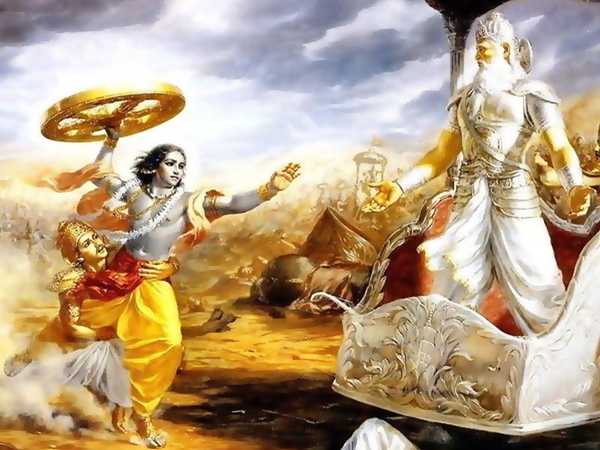Chapter 82

“Vaisampayana said, ‘Yayati then, on returning to his capital which waslike unto the city of Indra, entered his inner apartments and establishedthere his bride Devayani.
And the monarch, directed by Devayani,established Vrishaparvan’s daughter Sarmishtha in a mansion especiallyerected near the artificial woods of Asokas in his gardens. And the kingsurrounded Vrishaparvan’s daughter Sarmishtha with a thousand maids andhonoured her by making every arrangement for her food and garments. Butit was with Devayani that the royal son of Nahusha sported like acelestial for many years in joy and bliss. And when her season came, thefair Devayani conceived. And she brought forth as her first child a fineboy. And when a thousand years had passed away, Vrishaparvan’s daughterSarmishtha having attained to puberty saw that her season had come. Shebecame anxious and said to herself, ‘My season hath arrived. But I havenot yet chosen a husband. O, what hath happened, what should I do? How amI to obtain the fruition of my wishes? Devayani hath become mother. Myyouth is doomed to pass away in vain. Shall I choose him also for myhusband whom Devayani hath chosen? This is, indeed, my resolve: thatmonarch should give me a son. Will not the virtuous one grant me aprivate interview?’
“Vaisampayana continued, ‘While Sarmishtha was thus busy with herthoughts, the king wandering listlessly came to that very wood of Asokas,and beholding Sarmishtha before him, stood there in silence. ThenSarmishtha of sweet smiles seeing the monarch before her with nobody towitness what might pass, approached him and said with joined palms, ‘Oson of Nahusha, no one can behold the ladies that dwell in the innerapartments of Soma, of Indra, of Vishnu, of Yama, of Varuna, and of thee!Thou knowest, O king, that I am both handsome and well-born. I solicitthee, O king! My season hath arrived. See that it goeth not in vain.’
“Yayati answered, ‘Well do I know that honour of birth is thine, born asthou art in the proud race of the Danavas. Thou art also gifted withbeauty. I do not, indeed, see even the speck of a fault in thy feature.But Usanas commanded me, while I was united with Devayani, that nevershould Vrishaparvan’s daughter he summoned to my bed.’
“Sarmishtha then said, ‘It hath been said, O king, that it is not sinfulto lie on the occasion of a joke, in respect of women sought to beenjoyed, on occasions of marriage, in peril of immediate death and of theloss of one’s whole fortune. Lying is excusable on these five occasions.O king, it is not true that he is fallen who speaks not the truth whenasked. Both Devayani and myself have been called hither as companions toserve the same purpose. When, therefore, thou hadst said that you wouldstconfine thyself to one only amongst as, that was a lie thou hadstspoken.’ Yayati replied, ‘A king should ever be a model in the eyes ofhis people. That monarch certainly meets with destruction who speaks anuntruth. As for myself, I dare not speak an untruth even if the greatestloss threatens me!’ Sarmishtha answered, ‘O monarch, one may look uponher friend’s husband as her own. One’s friend’s marriage is the same asone’s own. Thou hast been chosen by my friend as her husband. Thou art asmuch my husband, therefore.’ Yayati then said, ‘It is, indeed my vowalways to grant what one asketh. As thou askest me, tell me then what Iam to do.’ Sarmishtha then said, ‘Absolve me, O king, from sin. Protectmy virtue. Becoming a mother by thee, let me practise the highest virtuein this world. It is said, O king, that a wife, a slave, and a son cannever earn wealth for themselves. What they earn always belongeth to himwho owneth them. I am, indeed, the slave of Devayani. Thou art Devayani’smaster and lord. Thou art, therefore, O king, my master and lord as muchas Devayani’s! I solicit thee! O, fulfil my wishes!’
“Vaisampayana continued, ‘Thus addressed by Sarmishtha, the monarch waspersuaded into the truth of all she spoke. He therefore, honouredSarmishtha by protecting her virtue. And they passed some time together.And taking affectionate farewell of each other, they then parted, eachreturning to whence he or she had come.
“And it came to pass that Sarmishtha of sweet smiles and fair eyebrowsconceived in consequence of that connection of hers with that best ofmonarchs. And, O king, that lotus-eyed lady then in due course of timebrought forth a son of the splendour of a celestial child and of eyeslike-lotus-petals.'”




